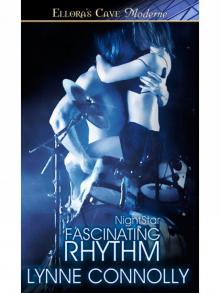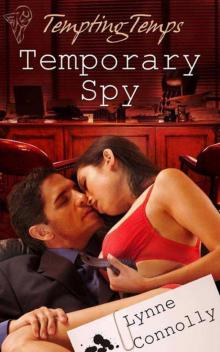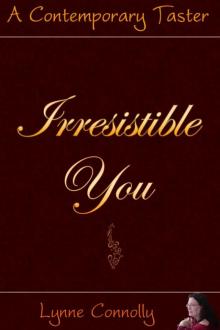- Home
- Lynne Connolly
FascinatingRhythm Page 2
FascinatingRhythm Read online
Page 2
“Won’t you be staying here?”
“I’ve booked a room at the Lydmar. I didn’t know if you’d turned the whole house into an office or if you were going away.”
“Sorry.” She didn’t look sorry, but she rarely revealed her feelings. Only a few people could read her and he wasn’t one of them. “But I knew you’d come because of the concert. I’ve been busy with the latest campaign. You should be too. Do you intend to stay at the Lydmar then? Your room is still available here.”
The house was decorated in typical Swedish style, with light wood furnishings, clear colors and polished wooden floors, the windows large and shaded only by light drapes. Despite that, the walls closed in on him, like the shrinking prisons of horror stories. When he’d entered this house as a child coming home from school, the tranquil hush was oppressive. His mother ensured that she knew when he’d come in, had a meal ready for him, checked that he’d done his homework before his hour’s TV and bed. The house was wired for sound. Movement and noise resulted in lights flashing on in her bedroom, protection in case he needed her in the night.
Only the system persisted. As a teenager, he knew he could never beat the curfew and he couldn’t play his music, except on headphones. He’d saved up and bought the best he could find, the kind that didn’t bleed sound.
A good childhood. Not deprived, quite the opposite in fact, nothing to complain about. So he hadn’t complained.
Now he replied, “Yes, I’ll be at the Lydmar. Out of your way.”
“You’re never in the way, my son.”
He knew. She’d made sure of it, that he had all the care he needed but wasn’t under her feet when she didn’t want him around. His mother stared at him, a faint smile on her face, a look of exasperation in her eyes. Or it might be impatience. Anyway, he’d seen that expression before. Time for him to take his leave. “I’ll come by tomorrow, Mother. If you’re not too busy.”
Anyone else might take that as sarcastic, but not his mother. She picked up the top-of-the-line cell phone that rested on her desk and flipped through the pages. Then she put it down and signed to him. “I’m in the office for most of the day. Come to dinner in the evening.” For the first time, she glanced at Sabina. “I don’t need you any more today. You may take tomorrow morning off if you wish. Go into town and meet Hunter for coffee, show him the changes in Stockholm.”
Always the perfect hostess. Or was there more to it? His eyes narrowed. She was up to something, though fuck if he knew what it was.
Chapter Two
Sabina had won a scholarship for a nearby elite school for the deaf, one that Emmelie Ostrander visited on a regular basis. A young schoolgirl, stumbling through the new world she found herself in, she’d fallen for the woman. Emmelie’s charisma, her cool beauty and her determination to fight for the rights of the deaf showed Sabina a new way of living. Starting with their very first conversation.
“I’m hearing impaired,” she’d painstakingly spelled out for her future boss.
Emmelie had rejected that description emphatically. “Never call yourself ‘hearing impaired’. Impaired implies there’s something wrong with you. There isn’t.” That simple statement had saved Sabina from her despair and self-pity, and she’d never looked back.
Sabina always counted herself lucky to meet one of the most dynamic women in her world, luckier to work for her, but sometimes Sabina wanted a little more room for herself. The system of lights, established originally to keep Hunter safe when he was a baby, still worked. Walk through a room and if Emmelie consulted the map of lights in her office, she could track the person’s progress, know how many people were in the house and where they were. In this city of cool, clear light, it seemed appropriate somehow. In her own country, where they had darkness for half the year, it would have been more intrusive, the lights brighter in the gloom.
Up to this point Sabina had cultivated a cool serenity that had seemed appropriate for her job and this city and this space. But to go out with Hunter, spend more time with him? Why would Emmelie want that? Sabina didn’t hide from Emmelie’s faults. She’d seen the increasing awkwardness for herself, an awkwardness that had led to coolness and then estrangement. If Emmelie wanted him back, she wasn’t above using Sabina as her tool to get him. Not that she’d do it.
Not her business, Sabina told herself firmly, despite the sadness that flooded her at the thought of the two at odds again. She came from a large and rambunctious family, and she was the only hard of hearing member. In this place of quiet and self-discipline, she missed the pounding of her youngest brother’s stereo, the shouts as the family communicated, some of which reached her and reminded her that she wasn’t alone.
Hunter opened the door for her and she left, following him through the house to where he’d parked his car outside. It glimmered in the sunshine, the bright red a splash of hot color against the cool green of the lawn behind. She put on a brilliant smile. “It was nice to see you.”
She didn’t need him to sign. He spoke now and she could lip-read very well. He signed anyway, the movements almost automatic, as if he didn’t know he was doing it. “It was nice to see you too.”
She put out her hand, touched his. He glanced down and saw their hands together, turned his big hand palm up and clasped hers before releasing it so he could sign. “I have a table booked. Come to dinner tonight.” His expression softened, warmed, became more intimate.
“Where did you book it?” She shouldn’t ask. She had no intention of going, truly she didn’t. Too much intimacy could lead to—too much intimacy.
His eyes cooled a tad to friendliness. “At the hotel. It has a great restaurant. I can get you a room there for tonight or drive you back later. Whichever you prefer.”
Their easy communication jolted her back into a world that had thrilled and confused her, made her think she had someone special. Not that he’d felt the same way. He’d, perhaps unknowingly, created dreams for her and then bolted. The only reason she was talking to him now was that she’d never given him a clue about how much she’d cared.
One night out of time, after he’d told her he was leaving. She hadn’t planned to change his mind or to get him to take her with him, but after he left—not a word. Nothing. That was what had hurt her so badly. A world of pain could be hers if she went with him now. She should refuse, go back in and spend the evening quietly in her room.
“Yes,” she signed. “I’ll come.”
He was waiting for her when she emerged ten minutes later with a small overnight bag. Just in case.
He stowed the bag in the tiny backseat, held open the door of the car for her, and would have helped her put her seat belt on if she hadn’t got there first. She hated that too careful treatment some people showed her, but she wouldn’t hold it against him. His mother had brought him up to have impeccable manners, and maybe that still lay underneath his actions. He was a gentleman, despite the faded jeans, the shoulder-length hair and the old T-shirt and leather jacket.
Vibrations purred through her as he started up the engine of the powerful sports car. He turned on to the main road and pulled in at the next parking spot. Heart in her throat, she turned to face him and this time he spoke. “I know you can lip-read. Do you want to drive to town in silence because I can’t drive and sign?” His voice came vaguely to her, spots of sound, drifting in and out, no practical use. Even then, she remembered it.
Guilt flooded her but she persisted, cleared her throat. “I can speak too.” She enunciated slowly and recalled it was weeks since she’d spoken to anyone. Emmelie didn’t ban it, but she did refuse to accept it in her house and discouraged it in her employees. Sabina always signed when she was working, interpreting for high-ranking deaf officials in various capacities.
“You always used to.” His expression softened, his eyes lost the flash of challenge. “I like your voice. Always have.”
When he looked at her like that, she melted. Already her pussy was dampening, readying itself for him, as t
hough it were on automatic pilot. She barely resisted rubbing her thighs together to ease the tingling. His nearness always affected her that way. She couldn’t let it.
Six years ago, he’d turned his back on her. She must never forget that, couldn’t afford to. Six years ago, she’d fled home to Iceland, broken in body and spirit, his silence having an effect on her worse than anything else in her life, even going deaf. She’d given it six months, had written to his old email address, the only one she had, but the address had gone inactive and he never sent her a new one, nor a physical address. Missing him more than she wanted to admit, she’d gone home, like a wounded animal seeking its lair. But she’d regrouped and come back. She had a life to lead and it was here.
Emmelie had accepted her back without a word, never spoke of her son, as if he’d never existed.
Sabina turned her attention to the road ahead, effectively stopping the conversation. “Thank you,” she said stiffly. But she wanted to know. The sound of her voice reverberated around her head. People had told her she had a great voice for a deaf person. She’d carefully retained what she’d learned as a child, proud to use it in public situations. People didn’t always realize she was deaf.
He started the car again and drove. They kept the conversation short and impersonal, talking about the weather, the beauty of the landscape they were passing through—strangers sharing a car. He kept his attention on the road, watching the countryside give way to the outskirts of Stockholm.
He’d chosen one of the best hotels in Stockholm. As he slowed outside the building a valet came forward to wait until he’d come to a stop so he could open the door for her and then take the car to the parking lot.
She stood on the pavement and stared up at the huge front of the Lydmar hotel. It was one of the tall, white buildings, coolly classical, that gave Stockholm so much of its character, situated in the center of the city overlooking the broad expanse of the Norrström River. She’d never been inside. As was true of most local residents, hotels meant little to her.
Sabina didn’t belong here. As she walked through the glass doors and into the main body of the hotel, she wished she did. Someone had designed this place with an eye to style. The foyer didn’t feel soulless, and when Hunter touched her elbow to guide her to the restaurant, she felt almost comfortable, which she rarely did in the presence of luxury and expense. Strange. Perhaps it was because she was with him. No. That wasn’t possible. Just that she was exploring a part of Stockholm that she’d not visited before. On her days off, she sometimes came to this district to visit the museum, so it wasn’t as if she didn’t know it at all.
She hadn’t expected a hotel restaurant to contain a wall of bookshelves, neither had she expected sofas and comfortable chairs framing the tables. The maître d’ took them to their table without delay, a place set to one side of the restaurant, not in the full light. Then she understood. Hunter had become a local celebrity.
She waited until the maître d’ left them with their menus before she ventured to speak. She was sitting with her back to the restaurant and most of the sources of light. Frowning, she concentrated on his lips so as not to miss a word. “Did you know I was in Stockholm?” A faint hope, but not one she had any faith in, that he’d come back to see her as well as to visit his mother.
“I didn’t know. Emmelie never mentioned it.” He met her gaze, his own dark from the shadows, and maybe something else? No, she couldn’t think like that. Then his face lightened and he smiled. It was like the sun coming out. “But I’m glad.” He glanced around. “It’s too dark here, isn’t it?”
He beckoned the waiter and had a quiet word with him. Hunter switched from English to Swedish with the ease of someone supremely comfortable in both languages. She wondered if he had an accent of any kind. She’d love to hear it. They always spoke English together, even used ASL or SEE when they signed, dating right back to the days they’d first met.
The waiter took them to another table near a window where the light still filtered in from outside. It was only seven thirty; it wouldn’t get dark for another couple of hours. She could see him much better here. How thoughtful of him to notice and have the table changed. “Thank you,” she said.
He smiled. “I want you to enjoy the meal. Have you decided what you want to eat?”
“Scallops and steak,” she said. She’d barely glanced at the menu. “They’re famous for it here.”
He raised a brow. She remembered those eyebrows, browner than his hair, matching his lashes and the hair on his body. No, not going there. Her mind raced on, as if it had a will of its own, ignoring her commands. Six years ago, he’d had a beautiful body, only a light sprinkling of hair on his chest, his shoulders already strongly developed from playing his percussion instruments. Then, he’d considered a career as a classical percussionist but his mother had shown no interest when he’d told her. “What do I care?” she’d said. “I can’t hear any of it. Choose what you like best to do.”
Nobody except Sabina had seen his hurt, because he’d covered it with insouciance, shrugged and left the room. That was when Sabina had gone to him. Just before he left.
One thing she had to know, had wondered for all this time. “Why didn’t you write to me after you left?”
He blinked, eyes wide, and touched his finger to her lips in a gesture that left her utterly shaken. She sat back out of his reach and stared at him, unwilling to miss a single word.
He signed his answer. “This is a quiet place and you were a little loud there.” Flushing, she closed her eyes before opening them again when she thought she’d regained her composure. He was waiting for her. This time he used his vocal cords, but in English.
“Let’s talk about other things over dinner.”
Was he trying to avoid talking to her about the things that had caused her so much pain? Probably, especially if she’d shouted her question.
She thought her appetite had gone, but the scallops proved her wrong. Every bit as delicately flavored and tender as the reviews had promised. A tiny sliver of black truffle lay over the top and she saved it for last. She glanced up from time to time, her habit in case she was missing his words, but he knew how to communicate with the deaf. He’d touch her hand or tap the table where she could see it if he wanted to speak to her.
He smiled when she glanced up. “You have a lovely accent, you know that?”
She shook her head. “I thought I spoke English clearly.”
“It is clear, but slightly accented.” He stared at her, his eyes unreadable. She couldn’t tell what he was thinking and she’d studied body language closely enough that she could usually tell.
“Are they playing music?”
He smiled. “Quietly. A classical piece. Do you know Chopin’s nocturnes?”
Tears sprang to her eyes and because he was watching her so closely, he saw them. He touched her hand. No more, just that. She took care to keep her voice down, regulating the strength of the vibrations in her throat. “My mother used to play them when I was little. I remember a mood rather than the notes.”
“I’m sorry. I was trying to give you a sense of what’s going on. I should have known better.” He broke visual contact, turning his attention to his food.
He shouldn’t feel bad about saying that. “You were right. How were you to know? The memories are good.”
A smile flickered across his lips, gone as soon as it had arrived, and he looked up again. “Thank you. I didn’t deserve that. It’s just that music means, well, a lot to me. I always notice when it’s playing.”
“Did it always mean so much?”
“Yes.”
A simple but devastating answer. To love music so much and grow up in a silent household—what torture he must have undergone. “When you were a child, you must have felt so alone.”
He shrugged. “I found friends. I went to a hearing school. It was okay.”
He’d clammed up. She’d find out no more from him now, but he’d opened his mind a crack a
nd given her a glimpse of the inner man. The hint only made her hungry for more. She needed a reason for the way he’d hurt her when he’d walked away and she knew the answer couldn’t be simple. Turning his back on their affair after one night was one thing, but he’d also repudiated their friendship and that had been the hardest to bear.
They ate, chatted about inconsequential matters, both of them avoiding topics that might mean more to them. He told her about America, a place she’d always meant to visit, and she told him about Iceland, with its economic problems and its sheer beauty. They talked about London, somewhere they’d both visited but not together. And Malmö, where the band was due to play in a couple of days’ time. He told her about Murder City Ravens, the band that, it soon became obvious, meant more to him than anything else in life. She realized he did more than play the drums. He was playing with percussion, experimenting with different sounds, different instruments, and using electronics to vary it.
The waiter came to remove their plates and asked if they wanted dessert. Hunter touched her hand so she turned her attention to him. “I’d like to have dessert and coffee upstairs where we can talk, but it’s all right if you want to stay down here.”
She swallowed. He’d never open up to her in a public place. She doubted he’d do it upstairs, but at least she’d have a better chance. There existed another possibility. He might want to take her to bed and she sure as shit wanted to relive that one, incandescent experience. But he’d leave her again.
She might not break as badly this time if she braced herself for it, kept herself apart. If she persuaded him to maintain their friendship. She’d trained herself into stoicism. “Yes,” she said. If he asked, she might. She’d decide at the time. He might not ask. She’d caught glances and smiles, but she didn’t know this man well enough anymore to tell if he wanted her or if he was just being friendly. Frustration made her want to growl.
They gave their order and left the restaurant. As they crossed the foyer toward the elevators, he reached for her hand and threaded his fingers between hers. Warmth and a feeling of utter safety filled her instantly, something she shouldn’t experience, not here, not now. Not with this man. Time must have passed because the light outside was noticeably softer, on its way toward sunset. She glanced at the clock. They’d taken nearly two hours over their meal. She didn’t remember that kind of time passing. On the way up to his room, she made a confession. “I enjoy talking with you. I mean verbally. I haven’t done it for a while.”

 Boundless (The Shaws)
Boundless (The Shaws) Sinless (The Shaws)
Sinless (The Shaws) The Girl with the Pearl Pin
The Girl with the Pearl Pin Hosts to Ghosts Box Set
Hosts to Ghosts Box Set The Making of a Marquess
The Making of a Marquess Boundless
Boundless Beauty of Sunset
Beauty of Sunset Virginia And The Wolf
Virginia And The Wolf Department 57: Bloody Crystal
Department 57: Bloody Crystal Temptation Has Green Eyes
Temptation Has Green Eyes Forged by Love: Even Gods Fall in Love, Book 4
Forged by Love: Even Gods Fall in Love, Book 4 IntheMood
IntheMood Hareton Hall: Richard and Rose, Book 6
Hareton Hall: Richard and Rose, Book 6 ShiftingHeat
ShiftingHeat Rendezvous at Midnight
Rendezvous at Midnight Yorkshire: Richard and Rose, Book 1
Yorkshire: Richard and Rose, Book 1 Lisbon: Richard and Rose, Book 8
Lisbon: Richard and Rose, Book 8 Devonshire: Richard and Rose, Book 2
Devonshire: Richard and Rose, Book 2 Venice
Venice War Chest: Even Gods Fall in Love, Book 5
War Chest: Even Gods Fall in Love, Book 5 Dilemma in Yellow Silk (Emperors of London)
Dilemma in Yellow Silk (Emperors of London) BornontheBayou
BornontheBayou Dauntless (The Shaws)
Dauntless (The Shaws) Brutally Beautiful
Brutally Beautiful Lightning Unbound: Even Gods Fall in Love, Book 1
Lightning Unbound: Even Gods Fall in Love, Book 1 FascinatingRhythm
FascinatingRhythm Fearless
Fearless A Chance to Dream
A Chance to Dream Mad for Love: Even Gods Fall in Love, Book 2
Mad for Love: Even Gods Fall in Love, Book 2 Sinless
Sinless SailtotheMoon
SailtotheMoon Wild Lavender
Wild Lavender Department 57: Rubies of Fire
Department 57: Rubies of Fire Maiden Lane
Maiden Lane Harley Street
Harley Street Dauntless
Dauntless NicenEasy
NicenEasy It Started at Waterloo
It Started at Waterloo Temporary Spy
Temporary Spy BorntobeWild
BorntobeWild Dilemma in Yellow Silk
Dilemma in Yellow Silk Yorkshire
Yorkshire The Thorndykes 1: Dispossessed
The Thorndykes 1: Dispossessed The Thorndyke Trilogy 2: Dancing at Midnight
The Thorndyke Trilogy 2: Dancing at Midnight Learning to Trust
Learning to Trust Her Quicksilver Lover: Even Gods Fall in Love, Book 6
Her Quicksilver Lover: Even Gods Fall in Love, Book 6 Loving Lucy
Loving Lucy Irresistible You
Irresistible You Arrows of Desire: Even Gods Fall in Love, Book 3
Arrows of Desire: Even Gods Fall in Love, Book 3 Unbroken
Unbroken Devonshire
Devonshire Reckless in Pink
Reckless in Pink Rogue in Red Velvet
Rogue in Red Velvet